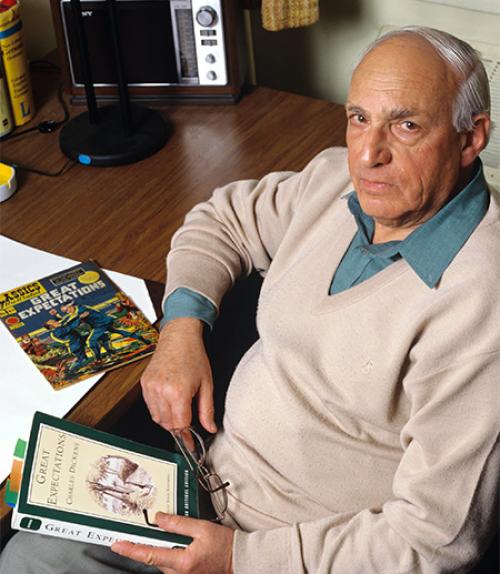Edgar Rosenberg ’49, MA ‘50, Professor emeritus of English and Comparative Literature, died on December 19 in Cayuga Heights at the age of 90.
“Edgar Rosenberg was the wittiest, most erudite and gracious colleague I’ve known at Cornell,” said Roger Gilbert, professor and chair of English. “He was enormously beloved by students and faculty and by friends and colleagues all over the world. He could always be counted on to lighten the mood at a meeting with a well-chosen quip or pun.”
A gifted scholar and creative writer, Rosenberg’s From Shylock to Svengali: Jewish Stereotypes in English (1960) continues to be regarded as a seminal work in the fields of English literature and Jewish studies. His Norton edition of Charles Dickens’s Great Expectations (1999) stands not only as the authoritative edition of that novel but also as a landmark of erudition and a joyful sharing of a life of learning, said Daniel Schwarz, Fredric J. Whiton Professor of English Literature.
“What Professor Rosenberg’s scholarship, creative work, teaching, and collegiality have in common are a wonderful generosity of spirit, a warm respect for others, a keen historical awareness, and a strong, good-natured sense of being alive,” said Schwarz.
Rosenberg is also the author of some fifty pieces of short fiction, translations, and articles in a wide variety of journals, including Esquire, Commentary and The Dickensian. He specialized in nineteenth- and twentieth-century fiction, Anglo-Judaic studies, the Elizabethans, Germany in the thirties, and writers such as Dickens, Mann and Shaw.
"Edgar Rosenberg was a great scholar of the British and European novel —his work on Dickens is especially memorable — and while immensely learned was also witty and ironic,” said Jonathan Culler, the Class of 1916 Professor of English and Comparative Literature. “He gave a cosmopolitan character to our department and was especially generous to junior faculty. He will be greatly missed."
Rosenberg was born in Fuerth in Bayern, Germany, in 1925. After his father fled to Switzerland, Rosenberg's mother negotiated with the Nazi bureaucracy for the departure of herself, Edgar, his younger brother Hans (Harry), and his paternal grandmother. They made it out of Europe aboard the Claus Horn in June 1939, landing in Port-au-Prince, Haiti. The family remained on the island until 1940, when they embarked for New York City. Rosenberg arrived in America knowing no English.
After high school, Rosenberg joined the U.S. Army and served in Europe, receiving a Combat Infantry medal in 1944. He attended Cornell on the GI Bill and was an exemplary student, elected to Phi Beta Kappa; he also won prizes for his fiction, including a $100 award in 1950 from Doubleday and Co.
His first published work, “The Assassin,” about interrogating prisoners of war at the front, appeared in 1958 in the second issue of Epoch, Cornell’s prestigious literary journal. “Next of Kin,” published soon after in Commentary, was a fictionalized account of a voyage to Haiti.
After receiving his PhD from Stanford in 1958, Rosenberg served as Briggs-Copeland Assistant Professor at Harvard University, until 1965. According to the Harvard Crimson, Rosenberg’s course in the history of the novel was extremely popular and between 1,500 and 2,000 Harvard and Radcliffe students took his courses.
He joined the Cornell faculty as Associate Professor of English in 1965, becoming full professor in 1969. From 1970-2002 he held a joint appointment as Professor of English and Comparative Literature.
Gerald Howard '72 wrote in a letter to Cornell Alumni Magazine that Rosenberg as a teacher was both fascinating and terrifying. “With his faintly European accent and arch, almost Nabokovian manner, he was a classroom presence of a sort I'd never met before. We lived to answer one of his imperiously posed questions in a way that would elicit a grunt of satisfaction … Here was my first encounter with an avatar of high culture.” Howard added that the class provided him with the most profound "Aha" moment of his education and inspired him to switch his major to English.
A recipient of fellowships from Guggenheim, Fulbright and Bread Loaf, Rosenberg is listed in Who’s Who in America and Who’s Who in World Jewry.
He is survived by his wife, Barbara Anne Hollington; his stepson and stepdaughter, Barnaby and Lucy; his son-in-law, Nicolas Boulloche; and his grandchildren, Martin and Sonia.
A memorial service is being planned for March 20, 2016.
Linda B. Glaser is a staff writer for the College of Arts & Sciences




